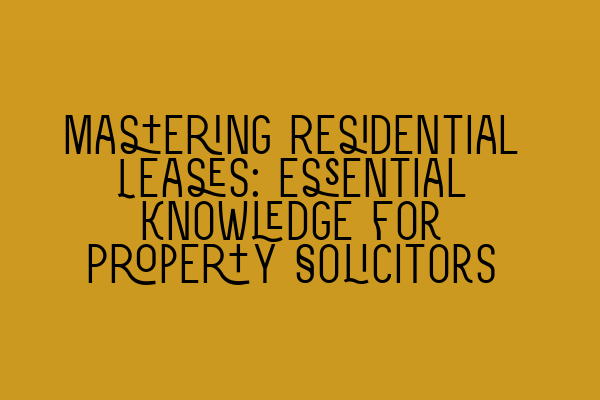Mastering Residential Leases: Essential Knowledge for Property Solicitors
As a property solicitor, understanding residential leases is a fundamental skill in providing proficient legal services to your clients. Whether you are a seasoned practitioner or a newly qualified solicitor, staying up-to-date with the intricacies of residential leases is crucial to ensure compliance with the law and to protect the interests of your clients.
In this comprehensive guide, we will delve into the essential knowledge that property solicitors need to master when dealing with residential leases. We will cover key topics such as the nature of residential leases, lease terms and clauses, statutory rights and obligations, and potential pitfalls to watch out for. So, let’s get started!
The Nature of Residential Leases
Residential leases, also known as tenancy agreements, are legally binding contracts that grant individuals the right to occupy a property for a specified period of time. These leases typically govern the relationship between landlords and tenants, outlining their rights, responsibilities, and obligations.
Understanding the different types of residential leases is essential in advising clients effectively. There are various types of leases, including assured shorthold tenancies, periodic tenancies, and fixed-term tenancies. Each type carries its own set of rights and obligations, and as a property solicitor, it is crucial to determine the appropriate lease type for your client’s situation.
Lease Terms and Clauses
Residential leases are composed of numerous terms and clauses that define the rights and obligations of both the landlord and the tenant. These clauses can cover a wide range of areas, including rent payments, maintenance responsibilities, the duration of the lease, and provisions for early termination.
As a property solicitor, it is vital to review and negotiate these terms on behalf of your clients, ensuring that their interests are protected. Careful attention should be given to rent escalation clauses, repair and maintenance obligations, and any restrictions or permissions related to alterations or subletting.
Further, understanding the implications of lease breach and the remedies available to both parties is crucial. It is essential to advise clients on the consequences of non-compliance with lease terms and provide guidance on potential legal actions or recourse.
Statutory Rights and Obligations
Residential leases are not only governed by the terms and clauses agreed upon between the landlord and the tenant, but they are also subject to various statutory rights and obligations. These legal requirements differ depending on the jurisdiction and may include regulations related to deposit protection, the right to quiet enjoyment, and minimum standards for rental properties.
As a property solicitor, it is imperative to have a comprehensive understanding of the relevant legislation and stay updated with any changes in the law. This knowledge will allow you to guide your clients in complying with their legal obligations and informing them of their rights as tenants.
For example, it is essential to advise tenants on their right to request repairs from the landlord or their obligations to provide reasonable access for property inspections.
Pitfalls to Watch Out For
While residential leases provide a framework for the landlord-tenant relationship, there are potential pitfalls that property solicitors must be aware of. These pitfalls can have significant consequences for both parties and may result in disputes or legal actions.
One common pitfall is the inclusion of unfair lease terms that may unfairly favor either the landlord or the tenant. As a property solicitor, it is your duty to identify any unfair terms and advise your client on potential challenges or negotiations.
Additionally, property solicitors should pay attention to potential issues such as illegal clauses, leasehold enfranchisement, and disputes over service charges. These situations require proactive legal advice and advocacy on behalf of your clients to address and resolve the issues effectively.
Mastering Residential Leases: A Continuous Journey
As with any area of law, mastering residential leases is an ongoing process. Staying updated with changes in legislation, case law, and best practices is crucial for property solicitors to provide the highest level of service to their clients.
If you are interested in learning more about contract law, related topics such as misrepresentation in contracts, the SQE Contract Law syllabus, or analyzing landmark cases and influential judicial decisions, be sure to check out our related articles:
- Misrepresentation in Contracts: Unveiling Deceptive Practices
- A Closer Look at SQE Contract Law Syllabus
- SQE Contract Law: Analyzing Landmark Cases and Influential Judicial Decisions
- Understanding Contractual Capacity: Rights and Limitations
- Interactive SQE Mock Tests for Contract Law: Test Your Knowledge
In conclusion, mastering residential leases is essential for property solicitors to provide effective legal services to their clients. By understanding the nature of residential leases, lease terms and clauses, statutory rights, and potential pitfalls, property solicitors can navigate the complexities of this area of law and ensure the best outcomes for their clients.
If you require assistance with residential leases or any other property law matters, our team of experienced property solicitors at SQE Property Law & Land Law is here to help. Contact us today to discuss your needs and benefit from our expertise in property law.
